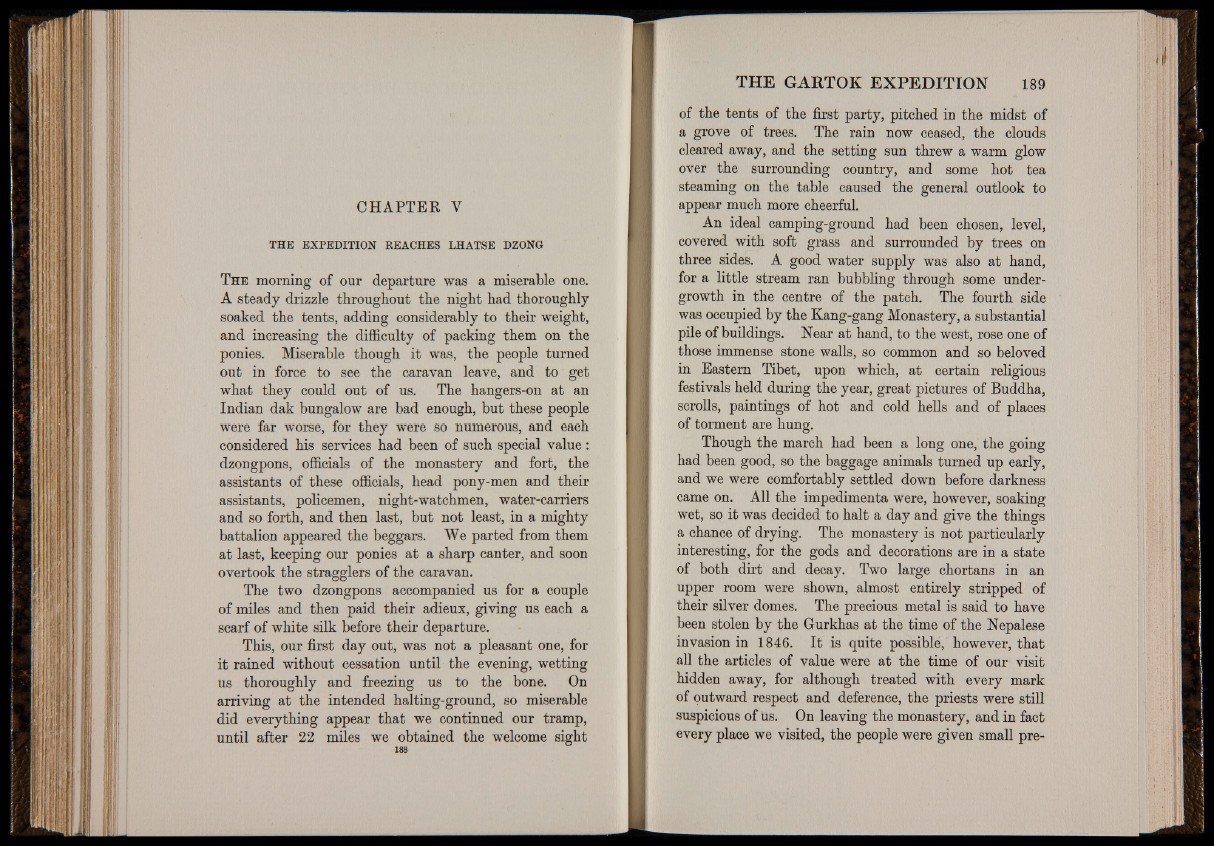
CHAPTER V
THE EXPEDITION REACHES LHATSE DZONG
The morning of our departure was a miserable one.
A steady drizzle throughout the night had thoroughly
soaked the tents, adding considerably to their weight,
and increasing the difficulty of packing them on the
ponies. Miserable though it was, the people turned
out in force to see the caravan leave, and to get
what they could out of us. The hangers-on at an
Indian dak bungalow are bad enough, but these people
were far worse, for they were so numerous, and each
considered his services had been of such special value:
dzongpons, officials of the monastery and fort, the
assistants of these officials, head pony-men and their
assistants, policemen, night-watchmen, water-carriers
and so forth, and then last, but not least, in a mighty
battalion appeared the beggars. We parted from them
at last, keeping our ponies at a sharp canter, and soon
overtook the stragglers of the caravan.
The two dzongpons accompanied us for a couple
of miles and then paid their adieux, giving us each a
scarf of white silk before their departure.
This, our first day out, was not a pleasant one, for
it rained without cessation until the evening, wetting
us thoroughly and freezing us to the bone. On
arriving at the intended halting-ground, so miserable
did everything appear that we continued our tramp,
until after 22 miles we obtained the welcome sight
188
of the tents of the first party, pitched in the midst of
a grove of trees. The rain now ceased, the clouds
cleared away, and the setting sun threw a warm glow
over the surrounding country, and some hot tea
steaming on the table caused the general outlook to
appear much more cheerful.
An ideal camping-ground had been chosen, level,
covered with soft grass and surrounded by trees on
three sides. A good water supply was also at hand,
for a little stream ran bubbling through some undergrowth
in the centre of the patch. The fourth side
was occupied by the Kang-gang Monastery, a substantial
pile of buildings. Near at hand, to the west, rose one of
those immense stone walls, so common and so beloved
in Eastern Tibet, upon which, at certain religious
festivals held during the year, great pictures of Buddha,
scrolls, paintings of hot and cold hells and of places
of torment are hung.
Though the march had been a long one, the going
had been good, so the baggage animals turned up early,
and we were comfortably settled down before darkness
came on. All the impedimenta were, however, soaking
wet, so it was decided to halt a day and give the things
a chance of drying. The monastery is not particularly
interesting, for the gods and decorations are in a state
of both dirt and decay. Two large chortans in an
upper room were shown, almost entirely stripped of
their silver domes. The precious metal is said to have
been stolen by the Gurkhas at the time of the Nepalese
invasion in 1846. It is quite possible, however, that
all the articles of value were at the time of our visit
hidden away, for although treated with every mark
of outward respect and deference, the priests were still
suspicious of us. On leaving the monastery, and in fact
every place we visited, the people were given small pre